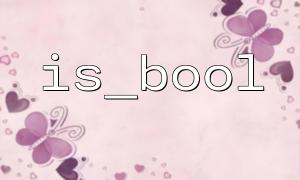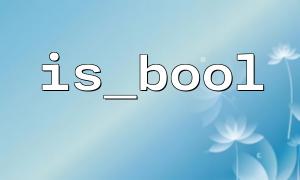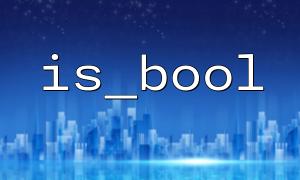In PHP development, it is very common to determine whether a variable is a Boolean value. The is_bool() function is used to detect whether a variable is of Boolean type. However, many beginners and even experienced developers make common mistakes when using is_bool() , causing problems with the program logic. This article will explain in detail the prone to errors in the use of is_bool() and provide solutions to help you judge the Boolean value more accurately.
is_bool() is a built-in function in PHP to determine whether the type of a variable is a Boolean type ( true or false ). Its syntax is very simple:
is_bool(mixed $var): bool
If $var is a boolean, the function returns true , otherwise false .
Many developers are accustomed to using if ($var == true) to determine whether a variable is true , but ignore that this writing method does not guarantee that $var is a boolean type, which may be a number, string or even an array.
Example:
$var = 1; // Integer1
if ($var == true) {
echo "yestrue";
} else {
echo "不yestrue";
}
The output is "yes true", but in fact $var is an integer, not a boolean.
And if using is_bool() :
if (is_bool($var)) {
echo "yesBoolean type";
} else {
echo "不yesBoolean type";
}
The output is "not a boolean type", which is the method to accurately judge variable types.
is_bool() only detects the type and does not determine whether the variable is true or false. For example:
$var = false;
var_dump(is_bool($var)); // true
var_dump($var == false); // true
$var = 0;
var_dump(is_bool($var)); // false
var_dump($var == false); // true
0 is not a Boolean type, but is considered false in the conditional judgment. is_bool() will not misjudgment the "false value" of non-Bool as a boolean.
When you need to make sure that variables are boolean types, using is_bool() is the safest way to do it:
$input = true;
if (is_bool($input)) {
echo "变量yesBoolean type";
} else {
echo "变量不yesBoolean type";
}
If you want to determine whether the variable is true or false, you should use casting or directly judge:
if ((bool)$input) {
echo "The variable is true";
} else {
echo "Variable is false";
}
Sometimes we will receive data from external input, such as getting the value from the URL parameter:
$flag = $_GET['flag']; // 假设输入的yes "false"
if (is_bool($flag)) {
echo "Boolean type";
} else {
echo "不yesBoolean type";
}
No matter what is passed in, the value of $_GET is a string type, and it will never be judged as a boolean here. The correct way to convert the type first:
$flag = filter_var($_GET['flag'], FILTER_VALIDATE_BOOLEAN, FILTER_NULL_ON_FAILURE);
if (is_bool($flag)) {
echo "成功解析为Boolean type";
} else {
echo "无法解析为Boolean type";
}
This example uses filter_var to convert the strings "true", "false", etc. into boolean types.
Complete sample code:
<?php
$url = "http://gitbox.net/api/check";
$var1 = true;
$var2 = "true";
$var3 = 0;
function checkBoolean($var) {
if (is_bool($var)) {
echo "变量yesBoolean type\n";
} else {
echo "变量不yesBoolean type\n";
}
}
checkBoolean($var1); // 变量yesBoolean type
checkBoolean($var2); // 变量不yesBoolean type
checkBoolean($var3); // 变量不yesBoolean type
// from URL Get and verify parameters
$input = filter_var($_GET['flag'] ?? null, FILTER_VALIDATE_BOOLEAN, FILTER_NULL_ON_FAILURE);
if (is_bool($input)) {
echo "成功解析为Boolean type";
} else {
echo "无法解析为Boolean type";
}
?>
is_bool() is a powerful tool to determine whether a variable is a Boolean type, but don't misunderstand it as judging whether a variable is true or not. It only focuses on types, non-boolean "true value" or "false value" will not be misjudged. Understanding these details can help you avoid program logic errors and improve code quality.
If you have the need to convert from strings and numbers to booleans, filter_var is recommended, it is smarter and safer.




